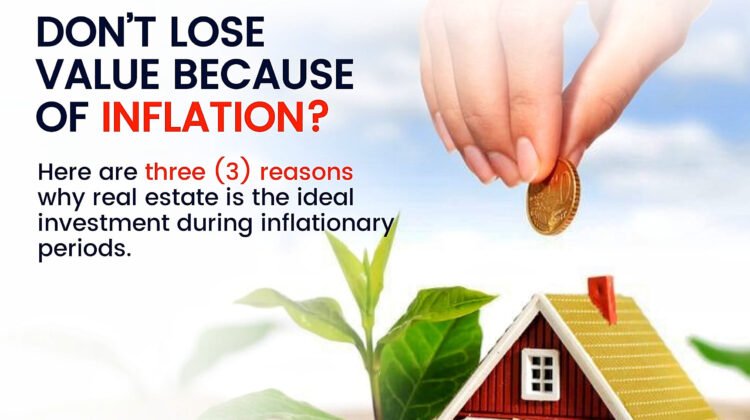
5 Powerful reasons to Hedge Against Inflation with Real Estate
Investing in real estate during inflationary periods is a smart decision that can bring significant returns for investors. Inflation can be a challenging time for investors, as the value of their investments can be eroded by rising prices. However, real estate has historically been a reliable investment during inflationary periods, providing a hedge against inflation and potentially even increasing in value.
Inflationary periods are periods of time when the general level of prices for goods and services in an economy is rising, leading to a decrease in the purchasing power of money. During inflationary periods, the cost of living typically increases as the prices of goods and services rise. This can be caused by various factors such as increased consumer demand, rising production costs, or expansionary monetary policies by central banks. Inflationary periods can erode the value of savings and investments over time if not managed effectively, making it important for individuals and businesses to consider strategies to protect against inflationary pressures.
In Nigeria, the rising inflation rate has proved to be a source of real worry for investors who are at a crossroad concerning making investment decisions at this time. In February 2024, for example, the headline inflation rate increased to 31.70% relative to the January 2024 headline inflation rate, which was 29.90%. There has also been an increase in inflation rate in March and April, heightening the concern of investors.
However, it had historically been shown that in times of inflation, when prices escalate across various sectors, real estate often emerges as a resilient asset class, demonstrating consistent appreciation in value
Investing in real estate during inflationary periods is a smart move that can help you not only protect your wealth but also potentially grow it. As prices rise across the board, real estate tends to appreciate in value, making it a solid investment option during times of inflation.
In fact, we can conclude that as inflationary pressures drive up the cost of goods and services, the demand for real estate typically follows suit, leading to an increase in property values. Therefore, by strategically diversifying your investment portfolio to include real estate assets, you as an investor position yourself to capitalize on the inherent stability and growth potential of the property market, thereby fortifying your financial position amidst inflationary environments.
I read the interesting story of a young man online who found solace investing in real estate during inflation. He wrote:
“It is no news any more that Naira went to an all-time high of #1,300 to 1$, immensely reducing the purchasing power of Naira, Just like now, some years ago when Inflation was causing chaos.
“My money was shrinking, and I felt like I was losing a game I didn’t even know I was playing. That’s when I discovered real estate investment. Imagine playing a game where your money is disappearing, and you don’t even know the rules. I kept losing to the game, it seemed it was completely rigged against me.
“But the story gradually changed when I found out a saving hero – which was investing in real estate.
“I invested in some properties I could afford at the time, that was how my real estate investment in Nigeria journey started and for the first time, it felt like I was having a good stand against inflation.
“But it didn’t stop there – I took another step and rented out some of my properties. Every month, rent money came in, untouched by inflation. It’s like having a secret stash of gold coins that never loses its shine, giving you a steady income.”
Investing in real estate during inflationary periods is a smart move that can help you not only protect your wealth but also potentially grow it. As prices rise across the board, real estate tends to appreciate in value, making it a solid investment option during times of inflation.
I will show you six reasons why investing in real estate to Hedge against Inflation is a smart move.
1. Hedge against inflation: Properties are tangible assets that can serve as a hedge against inflation. The rising price of goods and services also means that the price of your property will rise during the inflationary period such as this and that would help protect your investment against the eroding purchasing power of the Naira. If you are already a property owner, especially one without debt, inflation is not bad news for you at all.

In times of inflation, while the value of money decreases, the value of real estate on the other hand tends to increase. This is because as prices rise, the cost of constructing new properties also goes up, leading to an increase in the value of existing real estate assets. By investing in real estate during inflation, you hedge against Inflation and protect your wealth from losing value and potentially even see a return on your investment.
2. Increase in rental income: During periods of inflation like this, rental prices increase just like the prices of other goods and services. This is therefore an avenue for property owners who make rental incomes on their property to increase their rents and enhance their cash flow. With such increase, you are able to keep up with inflation and benefit from it. This means that investing in real estate can provide you with a steady stream of income that can help ameliorate or even eradicate the effects of inflation on your other investments.

3. A third reason to hedge against inflation is that real estate has intrinsic value. This means that real estate possesses inherent worth or value that is independent of external factors such as market conditions or investor sentiment. Unlike financial assets such as stocks or bonds, which derive their value primarily from market perceptions and demand, real estate derives its value from its physical attributes, location, and utility.
In other words, real estate has value because it serves a fundamental human need for shelter, space, and functionality. Regardless of economic conditions or market fluctuations, real estate properties have tangible attributes such as land, buildings, and improvements that provide utility to individuals and businesses. This intrinsic value is derived from factors such as location, accessibility, amenities, and quality of construction, which contribute to the desirability and usefulness of the property.

Unlike stocks or bonds, therefore, which can fluctuate in value based on market conditions, real estate is a tangible asset with inherent value. This means that even if the value of the currency decreases due to inflation, the value of real estate is less likely to be affected. In fact, real estate values tend to increase during inflationary periods, as the cost of materials and labour for construction also rises.
4. Additionally, real estate is a tangible asset that you can physically see and touch. Unlike stocks and bonds, which may only exist as numbers on a screen, real estate provides a sense of security and stability.
When you invest in real estate, you are purchasing a physical piece of property that you can physically see and touch. This provides an impossible sense of security with intangible investments like stocks and bonds. There is a certain comfort that comes from visiting your property, walking around the grounds, and seeing first-hand the value of your investment.
5. Another reason to hedge against inflation is that real estate is a versatile investment that provides investors with multiple ways to profit. In addition to rental income, investors can also benefit from property appreciation. As the value of real estate tends to increase over time, investors can realize significant gains by selling their properties at a higher price than they paid for them. This can be especially lucrative during inflationary periods when real estate values are likely to rise even further.
6. Leverage on financing options: Real estate investors have the opportunity to harness the power of leverage through various financing options. In times of high inflation, the value of debts used to finance properties may diminish in real terms as the purchasing power of currency decreases. This means that the debts incurred to acquire real estate assets may become less burdensome over time, as the amount owed remains fixed while the value of the currency decreases.
By leveraging financing, investors can amplify their purchasing power and acquire properties that they may not have been able to afford outright. This strategic use of leverage allows investors to maximize their returns and enhance their overall investment portfolio, providing them with greater flexibility and potential for growth in inflationary environments.
Overall, when you hedge against inflation presents a wise choice, offering investors a dependable income source, prospects for asset value growth, and opportunities for leveraging their investments. Throughout history, real estate has demonstrated resilience during inflationary periods, serving as a hedge against rising prices and yielding substantial returns. Through meticulous property selection, diligent research, and leveraging favorable financing options, investors can position themselves for success in the real estate market amid inflationary conditions. Therefore, for avid investors seeking profitable avenues during inflation, incorporating real estate into their investment portfolio warrants serious consideration.








